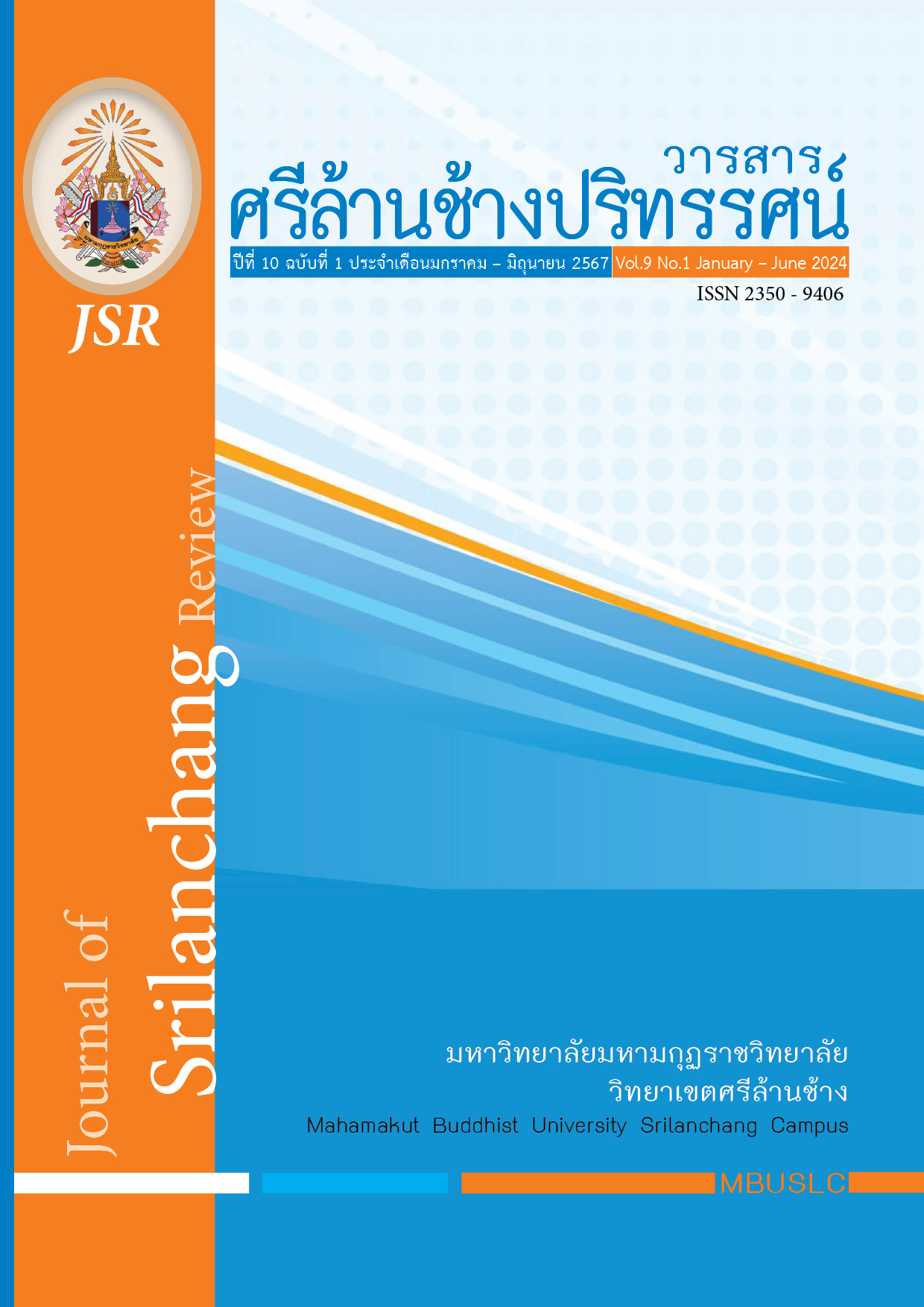GUIDELINES FOR DEVELOPING TEACHERS' LEARNING MANAGEMENT SKILLS IN THE DIGITAL AGE UNDER THE SUKHOTHAI SECONDARY EDUCATIONAL SERVICE AREA OFFICE
Main Article Content
Abstract
The purpose of this research is to study and guideline for developing teachers' learning management skills in the digital age. Under the Sukhothai Secondary Educational Service Area Office The research method is divided into 2 steps: Step 1: Study of teachers' learning management skills in the digital age. The sample group consisted of 285 teachers. The tool used to collect data was a questionnaire on teachers' learning management skills in the digital age. Sukhothai Secondary Educational Service Area Office It has a 5-level estimation scale. Data is analyzed with mean and standard deviation. Step 2: Study of guidelines for developing teachers' learning management skills in the digital age. The group of informants included 4 experts with knowledge and ability in digital technology, obtained through purposive selection. The tools used to collect data include an interview form and guidelines for developing teachers' learning management skills in the digital age. and analyzed the data using content analysis. The research results found that
- Results of the study of teachers' learning management skills in the digital age Overall, it is at a high level. When considering each aspect, it was found that the aspect with the highest average was the organization of learning processes combined with digital technology. at a high level And the aspect with the lowest average is the use of digital tools for learning. at a high level
2. The results of the study of guidelines for developing teachers' learning management skills in the digital age found that the Educational Service Area Office should organize training to provide knowledge in both online and on-site formats regarding the use of technology in curriculum design. Support budget for teachers' use of learning management applications. Organize a contest on the use of innovative media and digital tools for learning. and continuously organize meetings in the On Line format
Article Details

This work is licensed under a Creative Commons Attribution-NonCommercial-NoDerivatives 4.0 International License.
บทความที่ได้รับการพิจารณาจากคณะกรรมการผู้ทรงคุณวุฒิและเผยแผ่ในวารสารฉบับนี้ เป็นทัศนคติและข้อคิดเห็นส่วนบุคคลของผู้เขียนแต่ละท่าน ไม่ถือว่าเป็นทัศนะคติและความรับผิดชอบ
ของบรรณาธิการ
บทความ ข้อมูล เนื้อหา รูปภาพ ฯลฯ ที่ได้รับการตีพิมพ์ในวารสารศรีล้านช้างปริทรรศน์ ถือเป็นลิขสิทธิ์ของวารสารศรีล้านช้างปริทรรศน์ หากบุคคลหรือหน่วยงานใดต้องการนำทั้งหมดหรือส่วนหนึ่งส่วนใดไปเผยแพร่ต่อหรือเพื่อกระทำการใด ๆ จะต้องได้รับอนุญาตเป็นลายลักอักษรจากวารสารศรีล้านช้างปริทรรศน์ ก่อนเท่านั้น
References
กชพร มั่งประเสริฐ. (2565). รูปแบบการพัฒนาสมรรถนะครูยุค Thailand 4.0 สังกัดสำนักงานเขตพื้นที่การศึกษามัธยมศึกษาเพชรบุรี. วารสาร มจร พุทธปัญญาปริทรรศน์, 7(1), 78-88.
ไชยา ภาวะบุตร (2565). ภาวะผู้นำทางวิชาการของผู้บริหารที่ส่งผลต่อประสิทธิผลการบริหารงานโรงเรียน สังกัดสำนักงานเขตพื้นที่การศึกษามัธยมศึกษาสกลนคร นครพนม และมุกดาหาร. วารสารวิชาการและวิจัย มหาวิทยาลัยภาคตะวันออกเฉียงเหนือ, 13(4), 56-70.
ธีระ รุญเจริญ. (2562). แนวทางการบริหารการศึกษาในยุคนี้ Education Thailand 4.0. ใน เอกสารประกอบการบรรยายพิเศษเรื่องแนวโน้มการบริหารจัดการศึกษา. (เอกสารอัดสำเนา).
ปิยะภรณ์ อัครลาวัณย์ และสถิรพร เชาวน์ชัย. (2562). การศึกษาความต้องการและแนวทางในการพัฒนาสมรรถนะของครูสอนภาษาอังกฤษในโรงเรียนสังกัดสํานักงานเขตพื้นที่การศึกษามัธยมศึกษา เขต 40. วารสารการศึกษา และนวัตกรรม , 23 (3), 190–204.
พิมพันธ์ เดชะคุปต์, และพเยาว์ ยินดีสุข. (2562). ทักษะ 7C ของครู 4.0 (พิมพ์ครั้งที่ 5). กรุงเทพฯ: สำนักพิมพ์แห่งจุฬาลงกรณ์มหาวิทยาลัย.
ภาณุมาศ เกษรสุริวงค์ และสถิรพร เชาวน์ชัย. (2565). แนวทางการพัฒนาสมรรถนะการจัดการเรียนรู้ในยุคดิจิทัลของครูภาษาอังกฤษ ในโรงเรียนสังกัดสำนักงานเขตพื้นที่การศึกษาประถมศึกษานครสวรรค์เขต 2. วารสารวิจัยบัณฑิตศึกษา, 14(1), 81–97.
สถิรพร เชาวน์ชัย. (2561). การวิจัยทางการบริหารการศึกษา เอกสารประกอบการสอนวิชา 354517 การวิจัยทางการบริหารการศึกษา. พิษณุโลก: มหาวิทยาลัยนเรศวร.
สิริมงคล สุวรรณภา. (2566). การประเมินการพัฒนาความต้องการในการพัฒนาบทเรียนการเรียนรู้ในยุคดิจิทัลของการสอนนักศึกษาคณะศึกษาศาสตร์ มหาวิทยาลัยรามคำแหง: วิธีผสมผสาน. วารสารวิชาการและการวิจัยแบบสหวิทยาการ, 4 (2), 35–54.
อมรรัตน์ จินดา. (2558). สภาพปัญหาและแนวทางการส่งเสริมการใช้เทคโนโลยีสารสนเทศและการสื่อสารเพื่อการศึกษาสำหรับสถานศึกษาในสังกัดสำนักงานเขตพื้นที่การศึกษาประถมศึกษานครปฐม เขต 2. วารสารฉบับภาษาไทย สาขามนุษยศาสตร์ สังคมศาสตร์และศิลปะ, 9(1), 395-407.
อริยวัฒ เฉลิมกิจ. (2564). แนวทางการพัฒนาสมรรถะการใช้เทคโนโลยีสารสนเทศของครูในสถานศึกษาสังกัดสำนักงานคณะกรรมการอาชีวศึกษา จังหวัดพระนครศรีอยุธยา. วารสารมหาจุฬาวิชาการ, 8(3), 192 - 204.
อ่องจิต เมธยะประภาส. (2560). E-Teacher คุณลักษณะของครูและนักเรียนในศตวรรษที่ 21. จาก http://www.slideplayer.mcu.ac.th/?p=162.
Ally, M. (2019). Competency profile of the digital and online teacher in future education. International Review of Research in Open and Distributed Learning, 20(2).
Bazzano, D. (2011). Teaching skills: What 21st century educator need to learn to survive. Retrieved November 18, 2021, from https://www.masternewmedia. Org/teaching-skills-what-21st-century-educators-need-to-learn-to-survive/
Christensen, M. Clayton, Raynor, E. Michael, and McDonald, Rory. (2015). What is Disruptive Innovation?. Harvard Business. Review https://hbr.org/2015/12/what-is-disruptive-innovation.
Krumsvik, R. J., & Jones, L. Ö.(2013). Teachers’ digital competence in upper secondary school: (Work in Progress).International Conference on Information Communication Technologies in Education, 171-183.


